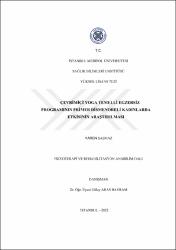| dc.contributor.advisor | Aras Bayram, Gülay | |
| dc.contributor.author | Şaşmaz, Yaren | |
| dc.date.accessioned | 2023-10-19T10:51:07Z | |
| dc.date.available | 2023-10-19T10:51:07Z | |
| dc.date.issued | 2022 | en_US |
| dc.date.submitted | 2022-01-07 | |
| dc.identifier.citation | Şaşmaz, Y. (2022). Çevrimiçi yoga temelli egzersiz programının primer dismenoreli kadınlarda etkisinin araştırılması. (Yayımlanmamış yüksek lisans tezi). İstanbul Medipol Üniversitesi Sağlık Bilimleri Enstitüsü, İstanbul. | en_US |
| dc.identifier.uri | https://tez.yok.gov.tr/UlusalTezMerkezi/tezSorguSonucYeni.jsp | |
| dc.identifier.uri | https://hdl.handle.net/20.500.12511/11616 | |
| dc.description.abstract | Bu çalışmada, primer dismenoreli (PD) kadınlarda çevrimiçi yoga temelli egzersiz tedavisinin ağrı, menstrual tutum, vücut farkındalığı ve yaşam kalitesi üzerindeki etkisini araştırmak hedeflendi. Çalışmamıza 18-35 yaş arası, PD şikâyeti olan 50 kadın dahil edildi. Katılımcılar randomize olarak müdahale (n=25) ve kontrol grubu (n=25) olmak üzere iki gruba ayrıldı. İki gruba da başlangıçta bilgilendirme eğitimi verildi. Müdahale grubu 8 hafta boyunca, haftada 2 seans yoga temelli egzersiz programı uygulandı. Katılımcıların ağrı şiddeti ''Görsel Analog Skala (GAS)'', menstruasyon tutumları ''Menstruasyon Tutum Ölçeği (MTÖ)'', vücut farkındalıkları ''Vücut Farkındalık Anketi (VFA)'', yaşam kaliteleri ''Kısa Form-36 (SF-36)'' ve tedaviden memnuniyetleri ''Memnuniyet Ölçeği'' ile değerlendirildi. Birbirini takip eden iki menstrual periyotta ölçümler tekrarlandı. Tüm değerlendirme ve uygulamalar çevrimiçi ve bireysel olarak uygulandı. Gruplar sosyodemografik ve menstrual döngü özellikleri bakımından benzerdi (p>0,05). Müdahale grubunun GAS skoru 6,76 puandan, 3,76 puana geriledi. Menstruasyon tutum skorları 4. hafta sonunda başlangıç skorları ile benzer seyrederken, 8. hafta sonunda istatistiksel olarak anlamlı bulundu (p<0,05). Vücut farkındalığı 4. haftadan itibaren istatistiksel düzeyde anlamlı bulundu ve bu sonuçlar 8. hafta sonuna kadar korundu (p<0,05). Yaşam kalitesi anketinin tüm alt parametrelerinde istatistiksel olarak anlamlı gelişmeler kaydedildi (p<0,05). Kontrol grubunda ise GAS skorları anlamlı düzeyde yükseldi (p<0,05). Menstrual tutum ve vücut farkındalığı skorlarında değişiklik gözlenmedi (p>0,05). Yaşam kalitesi anketinin ise sadece sosyal işlevsellik, ağrı ve genel sağlık alanlarında olumlu iyileşmeler bulundu (p<0,05). Çalışma sonunda çevrimiçi yoga temelli egzersiz programının PD'li bireylerde ağrı, menstrual tutum ve davranış, vücut farkındalığı ve yaşam kalitesi üzerinde olumlu etkiler oluşturacağı belirlendi. | en_US |
| dc.description.abstract | In this study, it was aimed to investigate the effect of online yoga-based exercise therapy on pain, menstrual attitude, body awareness and quality of life in women with primary dysmenorrhea (PD). Fifty women between the ages of 18-35 with PD complaints were included in our study. Participants were randomly divided into two groups as intervention (n=25) and control group (n=25). Information training was given to both groups at the beginning. In addition, a yoga-based exercise program was applied to the intervention group, 2 sessions per week for 8 weeks. Participants' pain intensity "Visual Analog Scale (VAS)", menstruation attitudes "Menstruation Attitude Scale (MBI)", body awareness "Body Awareness Questionnaire (VFA)", quality of life "Short Form-36 (SF)" -36)'' and their satisfaction with the treatment were evaluated with the ''Satisfaction Scale''. Measurements were repeated in two consecutive menstrual periods. All assessments and practices were administered online and individually. The groups were similar in terms of sociodemographic and menstrual cycle characteristics (p>0.05). The GAS score of the intervention group decreased from 6.76 points to 3.76 points. While the menstrual attitude scores were similar to the initial scores at the end of the 4th week, it was statistically significant at the end of the 8th week (p<0.05). Body awareness was found to be statistically significant from the 4th week and these results were maintained until the end of the 8th week (p<0.05). Statistically significant improvements were recorded in all sub-parameters of the quality of life questionnaire (p<0.05). In the control group, VAS scores increased significantly (p<0.05). No change was observed in menstrual attitude and body awareness scores (p>0.05). In the quality of life questionnaire, positive improvements were found only in the areas of social functionality, pain and general health (p<0.05). At the end of the study, it was determined that the online yoga-based exercise program would have positive effects on pain, menstrual attitude and behavior, body awareness and quality of life in individuals with PD. | en_US |
| dc.language.iso | tur | en_US |
| dc.publisher | İstanbul Medipol Üniversitesi, Sağlık Bilimleri Enstitüsü | en_US |
| dc.rights | info:eu-repo/semantics/openAccess | en_US |
| dc.subject | Ağrı | en_US |
| dc.subject | Egzersiz | en_US |
| dc.subject | Primer Dismenore | en_US |
| dc.subject | Telerehabilitasyon | en_US |
| dc.subject | Yoga | en_US |
| dc.subject | Exercise | en_US |
| dc.subject | Pain | en_US |
| dc.subject | Primary Dysmenorrhea | en_US |
| dc.subject | Telerehabilitation | en_US |
| dc.title | Çevrimiçi yoga temelli egzersiz programının primer dismenoreli kadınlarda etkisinin araştırılması | en_US |
| dc.title.alternative | Investigation of the effect of an online yoga-basedexercise program on women with primary dysmenhorrea | en_US |
| dc.type | masterThesis | en_US |
| dc.department | İstanbul Medipol Üniversitesi, Sağlık Bilimleri Enstitüsü, Fizyoterapi ve Rehabilitasyon Ana Bilim Dalı | en_US |
| dc.relation.publicationcategory | Tez | en_US |
| dc.institutionauthor | Şaşmaz, Yaren | |


















